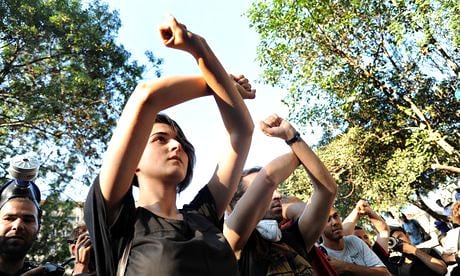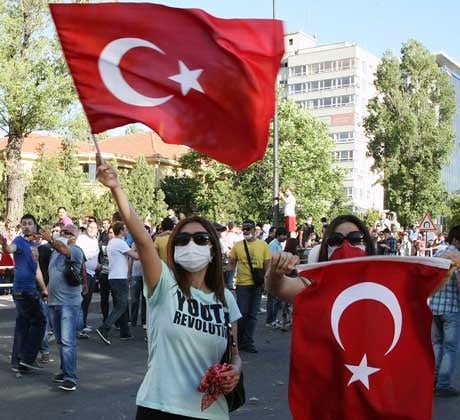Yasemin Dildar
May 18, 2018
“If one day our nation says ‘enough,’ then we will step aside,” Turkey’s President Recep Tayyip Erdoğan said last week in a speech to Turkey’s Parliament. Soon after the speech, #Tamam (“Enough”) became a trending Twitter topic worldwide with over 1.5 million tweets posted by the end of that night. Social media has become the primary platform for opposition against the government in Turkey since mainstream media is almost completely controlled by the government. However, Erdoğan’s statement did not only get reactions on social media. People came together in the streets with the slogan “Enough” in Istanbul. Police attacked several of these marches. The students of Middle East Technical University in Ankara also wrote “Tamam” (“Enough”) in Devrim (“Revolution”) Stadium.

Protesters in the capital, Ankara. Turkish politics is almost exclusively male-dominated.
Photograph: Burhan Ozbilici/AP
Last month, Erdoğan announced snap presidential and parliamentary elections for June 24, more than a year earlier than scheduled. There are several reasons behind Erdoğan’s move. Foreign debt above 500 billion US dollars, increasing inflation and unemployment, slowdown in construction sector growth, and the daily erosion of the lira (The Turkish lira lost over half of its value against the dollar since 2013) are all signs of a sharp slowdown. The sooner the vote, the better Erdoğan’s chances of winning before the crisis hits. Another reason is to benefit from the wave of Turkish nationalism after the military operation targeting Kurdish Democratic Union Party (PYD) militants in Afrin, Syria. The military campaign against Kurdish forces in Afrin was portrayed as a successful operation in the media. In his first speech after the announcement of snap elections, Erdoğan vowed that “the operations will continue until not one terrorist is left” as an election promise. The third reason is about catching the parliamentary opposition, especially the İyi (Good) Party led by Meral Akşener, off guard. The Iyi party has the potential to attract the votes of the nationalists who are abandoning the MHP (the Nationalist Movement Party) because of their leader’s U-turn from opposing Erdoğan to becoming his ally. Erdoğan ordered the Supreme Electoral Council of Turkey (YSK) to reduce the number of parties in the elections. The speed with which the snap elections were called was an attempt by the Erdoğan’s party, the AKP, to disqualify the İyi Party from running, because it had been registered less than the mandatory six-month period prior to elections. The social democrat opposition party, CHP (the Republican People’s Party) transferred 15 of its own parliamentarians to the İyi Party’s bloc of five (defectors from the MHP), entitling it to run in the election.
The opposition parties made an alliance agreement for the general elections. The strategy is to run as many presidential candidates as possible in the first round and to support Erdoğan’s rival in the second round. This can be either Akşener or the candidate of CHP, Muharrem Ince. The Kurdish HDP (People’s Democratic Party), whose leader is still in jail, was left out of the opposition alliance not to risk the nationalist votes for the alliance (particularly İyi Party votes).
These elections are going to be the first time Turkey votes for both president and parliament on the same day. The presidential system that gave Erdoğan unprecedented power was passed with a small margin in 2017 with a fraudulent referendum. Nobody thinks that the elections are going to be fair at this point under the state of emergency rule. The UN High Commissioner for Human Rights warned Turkey last week, stating that ‘‘the elections to be held under the state of emergency are not credible”. If Erdoğan wins, it will be a narrow win. He will have to face the ongoing problems. If he loses, he will not accept the result and he will seek to undo it.
Socialist parties are not able to go to the elections with their presidential candidates due to additional requirements set by YSK. Some of them declared that they will support HDP for strategic reasons. If HDP cannot pass the threshold vote (10%) in the first round, this will strengthen the AKP-MHP coalition. Some others protest the elections. For example, the Communist Party of Turkey (TKP) will participate in the general elections with independent candidates in several locations, but it is calling on people to protest the presidential elections by casting an invalid ballot. Half of the country is against the presidential system, and this is one way of showing opposition to the new system. TKP will use the election platforms to raise propaganda for system change and socialism.

Protesters at Istanbul’s Gezi Park in June 2013, at the height of the unrest.
Photograph: Bulent Kilic/AFP/Getty Images
Social democrats and other leftists are united with the rest of the opposition (including very reactionary elements of opposition) to get rid of Erdoğan. Sixteen years under the rule of AKP and Erdoğan meant increasing poverty and worsening working conditions for the working class. This period has seen the most extensive privatizations in the history of modern Turkey. The state-run tobacco company (TEKEL), chrome company, oil refinery Tüpraş, electricity companies, ports and other public establishments were all privatized. Occupational murders increased by 20 thousand under the AKP rule. State of emergency rules brought a ban on workers’ strikes. Overall inequality in society as well as poverty and indebtedness among workers has increased. The attacks on secular education, women’s rights, and the war against Kurdish citizens in Eastern provinces of Turkey are among many other reasons why people are united around the idea of getting rid of Erdoğan.
#TAMAM was a spontaneous response to Erdoğan and the AKP government’s policies. It gave a slogan to the opposition alliance. The alliance itself doesn’t have a program that will bring real change for working people. While the strategy for some socialists is to solely focus on defeating Erdoğan, this is a short sighted strategy, as socialists we need to emphasize the inadequacy of electoral politics and build a movement for revolutionary socialist change.
Yasemin Dildar is an economics professor at California State University San Bernardino. She writes for soL (“Left”), a socialist news site in Turkey.
